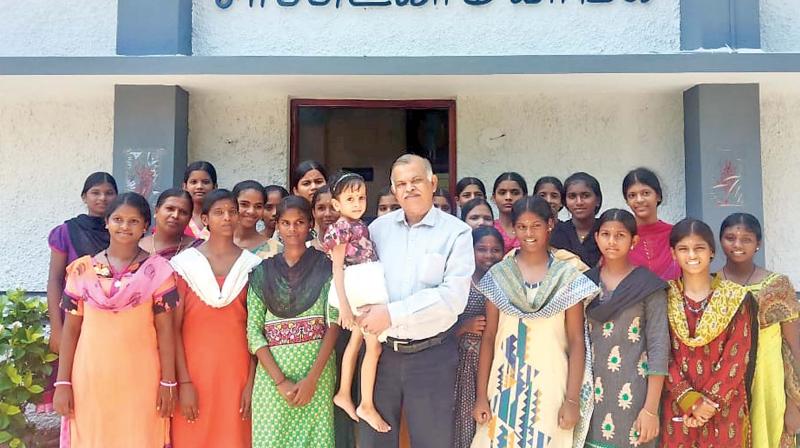Does India care for its mentally ill?
Ray of hope at Uduvum Karangal.

Chennai: The premises of Udavum Karangal at Thiruverkadu bears a stark contrast to the pictures of 'homes' and 'asylums' which has been painted in our heads for ages. There is no gloom looming large nor do you see sullen, sad faces. Rather, a family of 600 - both children and adults - abandoned by their own kith and kin, brought together by 'Paapa'.Vidayakaar go about their normal lives, engage in fun banters and play around gleefully.
Udavum Karangal traces its history back to 1983, when a severely malnourished baby boy, found abandoned in a movie theatre was handed over to Vidyakaar. There has no been looking back for the organisation ever since. Transcending human barriers of caste, creed, religion and in this case mental disability, the organisation is home to 2,000 people from varied backgrounds, staying true to its name ' hands that reach out to humanity'.
Udavum Karangal is also one of the very few organisations in the nation to care for homeless, mentally ill people. In a country where mental health has been largely overlooked for ages, the progress the organisation has made in treating and rehabilitating its rescued patients is highly inspiring, in the least. The buoyant, cheerful persona of the 50-year-old Velumani is one of several testimonies to this. " We picked her up from the streets of Coimbatore 20 years back. She had been sexually abused and was six months pregnant when we rescued her. She gave birth to a boy child here at Udavum Karangal and has stayed with us ever since", narrates .Vidyakaar as she shares a light moment with us. Her son Velamburi, now 20, also suffers from mild mental illness and is currently cared for at the Coimbatore branch of the organisation." I am extremely happy here", she beams when asked about how she likes the place.
Interestingly, a majority of these rescued patients are from the North Indian states. They were either abandoned for their mental illness by their own families or wandered their way off, explains Vidyaakar." The families put them onto trains or trucks heading south, in a bid to get rid of them." Most of them endure torture at the hands of strangers and are abused, exploited and ill-treated in the most inhuman ways.
"When we rescue a patient, we try our best to reunite them with their family. In some cases, the families accept them and in some others, they don't want them back.", he says. There are also a few instances where the families couldn't be traced. Anita's story is one such case. A mother of three children she came to Chennai with her husband, a migrant worker." Being deaf-mute, she had lost her way somehow. We found her roaming on the streets. We've been trying to locate her family ever since, but with no luck," says .Vidyakaar. However, Anita continues to remain optimistic." I'll visit this place regularly, even if I go back home.", she signals.
The happy demeanour of each woman at Udavum Karangal hides a tragic story, each one more brutal than the other. And the lives of people like Mariamma, only makes us question humanity. A repeat victim of sexual abuse, she gave birth to her first two children on the streets, both of whom were abducted by unknown men. She was rescued by social workers at Udavum Karangal when she was pregnant for the third time.
" Keeping the patients occupied is very important", says.Kavitha, a psychiatric nurse who has been working with the organisation's community college for the underprivileged for over three years now. For this very reason, the premises has an occupational training centre and pet therapy centres with several cows, hens and donkeys. The patients are also encouraged to indulge themselves in gardening, cooking and housekeeping.
Not so surprisingly, the children of the rescued women have also come to live with.Vidyakaar, along with the abandoned kids. Each of these children has unique names, which are in some way related to their stories of rescue. And interestingly all of their names end with 'Vidyakaar'. " There is a lot of social stigma attached to orphans or kids without fathers. I did not want my children to face that kind of discrimination and hence the decision", he explains.
Despite the continued reassurances the workers at Udavum Karangal offer, the children are highly prone to insecurities, he says. Priya, a psychologist who counsels the children at Udavum Karangal regularly, says, "Low self-esteem is a common problem we encounter in the kids. They always have questions like why their parents abandoned them or why their families did not accept them back.". However, these children are also far more competitive and open to learning than the other kids says a proud Lara Stuart, headmistress of Jeevan centre, the school run by Udavum Karangal.
"These children and adults are the rejected invisible fragments of our society. At the end of the day, caring for them requires no complex science or a government rule. It all comes down to one thing-kindness. And kindness can be provided at free of cost.", concludes Vidyaakar.

